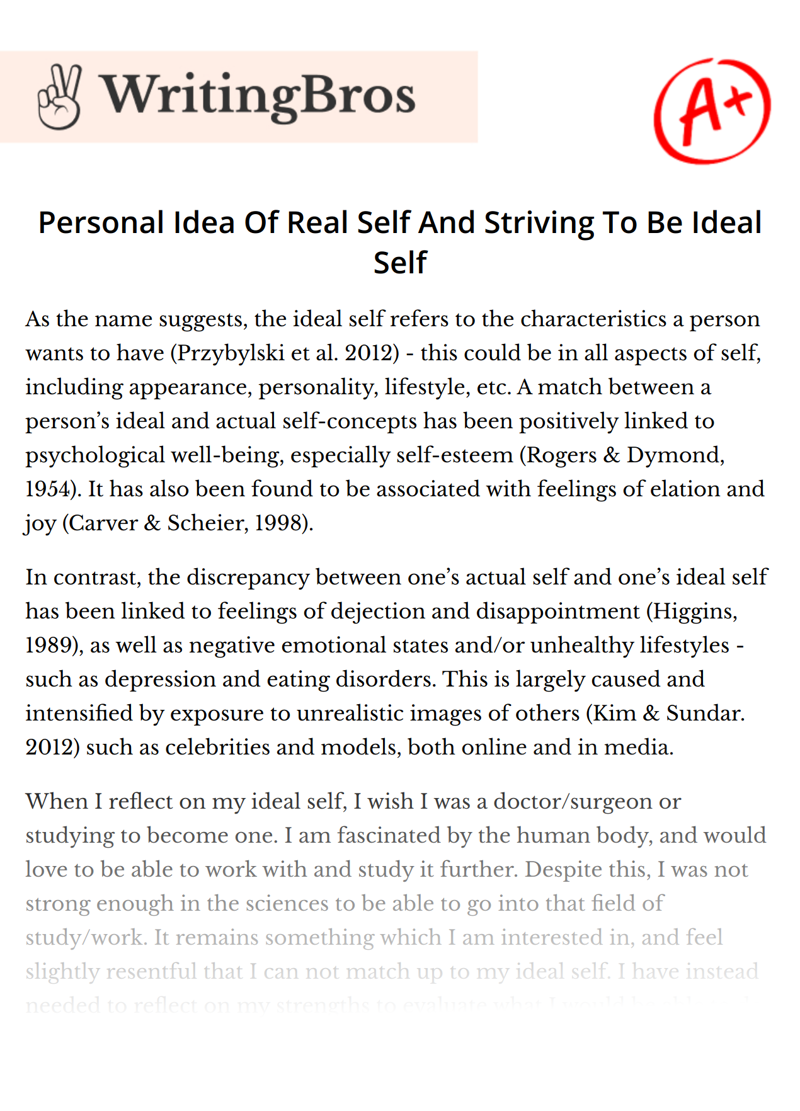Personal Idea Of Real Self And Striving To Be Ideal Self

As the name suggests, the ideal self refers to the characteristics a person wants to have (Przybylski et al. 2012) - this could be in all aspects of self, including appearance, personality, lifestyle, etc. A match between a person’s ideal and actual self-concepts has been positively linked to psychological well-being, especially self-esteem (Rogers & Dymond, 1954). It has also been found to be associated with feelings of elation and joy (Carver & Scheier, 1998).
In contrast, the discrepancy between one’s actual self and one’s ideal self has been linked to feelings of dejection and disappointment (Higgins, 1989), as well as negative emotional states and/or unhealthy lifestyles - such as depression and eating disorders. This is largely caused and intensified by exposure to unrealistic images of others (Kim & Sundar. 2012) such as celebrities and models, both online and in media.
When I reflect on my ideal self, I wish I was a doctor/surgeon or studying to become one. I am fascinated by the human body, and would love to be able to work with and study it further. Despite this, I was not strong enough in the sciences to be able to go into that field of study/work. It remains something which I am interested in, and feel slightly resentful that I can not match up to my ideal self. I have instead needed to reflect on my strengths to evaluate what I would be able to do career-wise, in order to find a new more attainable goal. As technically a mature student, I regret not having already completed university and being on a career path. This causes me to have feelings of embarrassment and disappointment (predicated by Higgins, 1989), especially as I compare myself to others my age.
The other image I have chosen to reflect my ideal self is Figure 9. As seen in this image, I was extremely tanned after a very hot summer. When comparing myself to this old image and to others’ social media posts, I wish I was this tanned year-round, as I feel like I look more healthy and socially-acceptable. In order to achieve this goal, I regularly purchase and apply false tan. As my actual self becomes closer to my ideal self, I feel the sense of elation and joy described by Carver & Scheier, 1998.
In terms of marketing, a 2011 study (Malär, Krohmer, Hoyer, & Nyffenegger) found that aspirational branding which relates to the ideal-self can help consumers to compensate low self- esteem, get closer to their ideal self, and increase their emotional attachment toward the brand - in cases where self-esteem or self-consciousness is low. This reflects my feelings and sentiments towards fake tan, specifically St Moriz tan, as it makes me feel more confident in myself as I get closer to my ideal self.
The study found that marketers can emphasize the self-enhancement potential of the brand, to portray the gap between actual and ideal selves and how the brand can contribute to its reduction - for example self-improvement marketing (e.g., 'before' and 'after' photos).
Cite this Essay
To export a reference to this article please select a referencing style below

